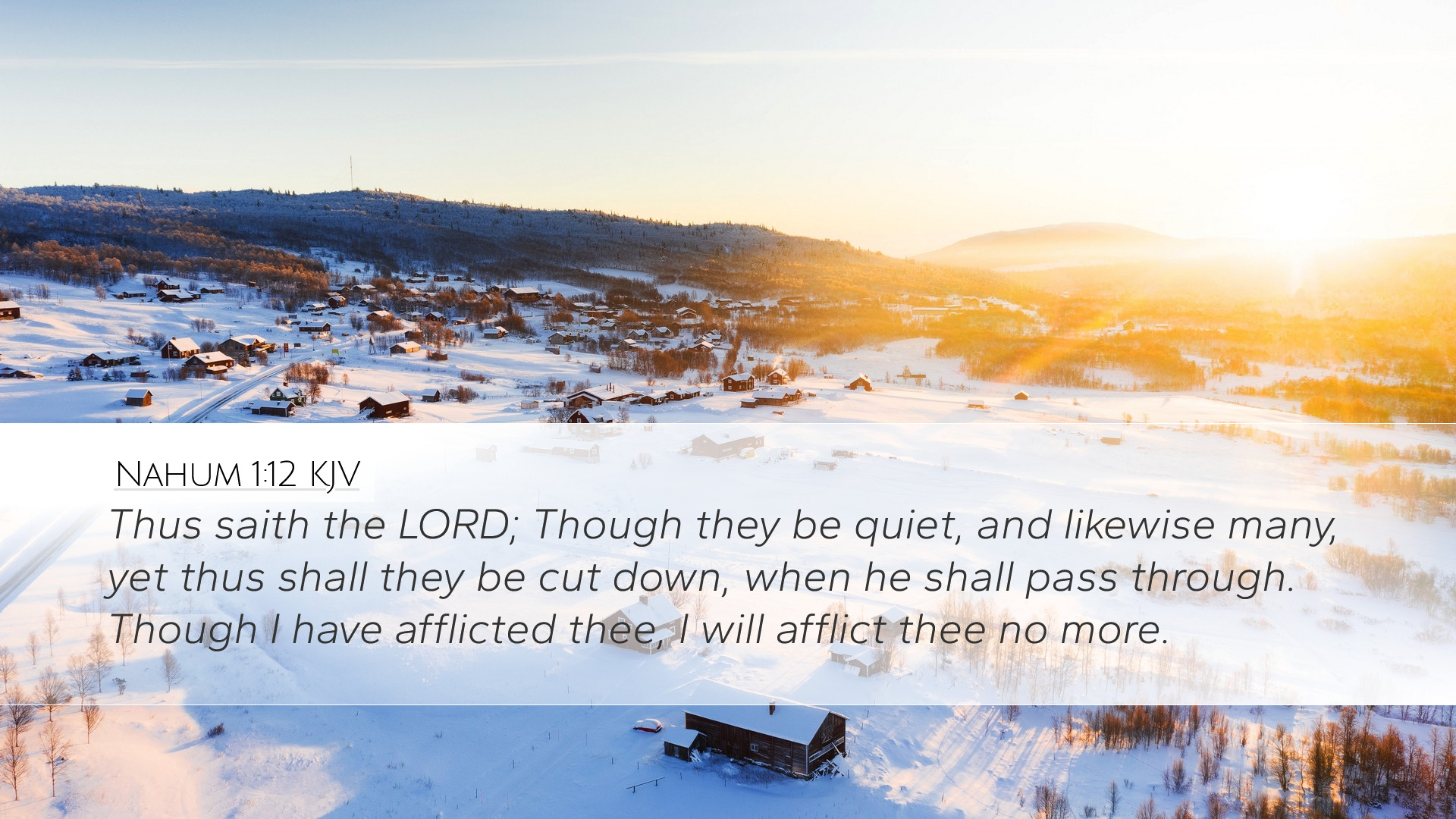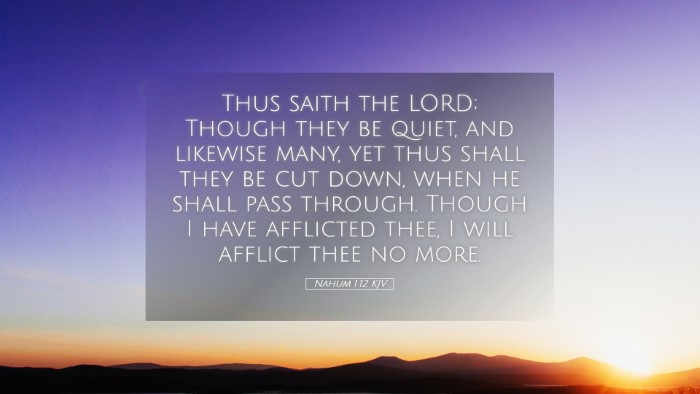Old Testament
Genesis Exodus Leviticus Numbers Deuteronomy Joshua Judges Ruth 1 Samuel 2 Samuel 1 Kings 2 Kings 1 Chronicles 2 Chronicles Ezra Nehemiah Esther Job Psalms Proverbs Ecclesiastes Song of Solomon Isaiah Jeremiah Lamentations Ezekiel Daniel Hosea Joel Amos Obadiah Jonah Micah Nahum Habakkuk Zephaniah Haggai Zechariah MalachiNahum 1:12
Nahum 1:12 KJV
Thus saith the LORD; Though they be quiet, and likewise many, yet thus shall they be cut down, when he shall pass through. Though I have afflicted thee, I will afflict thee no more.
Nahum 1:12 Bible Commentary
Commentary on Nahum 1:12
Nahum 1:12 states: "Thus saith the Lord; Though they be quiet, and likewise many, yet thus shall they be cut down, when he shall pass through." This verse serves as a pivotal point in the prophetic message delivered by Nahum regarding the coming judgment upon Nineveh, the capital of the Assyrian Empire. Various public domain commentaries provide profound insights into this verse, shedding light on its meaning and implications for understanding God’s justice and judgment.
Contextual Background
To grasp the significance of this verse, it is essential to consider the contextual background. Nahum prophesied during a time when Assyria was at the height of its power, renowned for its cruelty and oppression. The prophet’s message centers on divine retribution and the assurance that God will uphold justice even against the most formidable powers of the earth. Albert Barnes emphasizes the contrast between the current state of Assyria’s apparent stability and the impending doom that God has decreed. He notes that God observes the seeming tranquility of the Assyrians, who may appear secure in their power, yet their fate is sealed.
Divine Assurance of Judgment
The declaration of God in this verse echoes the theme of divine sovereignty. Matthew Henry asserts that even though the Assyrians might enjoy a fleeting period of peace and numerous numbers, they cannot escape divine judgment. He remarks on the certainty of God's word, which stands in stark contrast to human assumptions of safety. This divine judgment is not merely a human decree but comes with the ultimate authority of the Creator.
Symbolism of 'Quietness'
The term 'quiet' in this context can symbolize complacency. Nahum conveys through this word that the Assyrians may feel untroubled and secure, underestimating the impending consequences of their actions. Adam Clarke elaborates on this notion, suggesting that the quietude represents a false sense of security. The complacent and proud are often the targets of God’s quick and decisive judgment, emphasizing their ignorance of God’s power and the reality of His coming wrath.
The Significance of 'Many'
- Proportion of Power: The phrase 'likewise many' indicates that even a multitude cannot guarantee safety from God's judgment. This serves to remind the readers that numerical strength is meaningless against the Almighty.
- Unity in Rebellion: The multitude also symbolizes the collective rebellion against God. Thus, the larger the group that opposes divine authority, the greater the judgment they collectively invoke.
- Reality of Judgment: Regardless of strength in numbers, when divine judgment is pronounced, the result remains the same: destruction and downfall.
Implications of 'Cut Down'
The phrase 'cut down' carries connotations of finality and destiny. Henry points out that this phrase implies a decisive act of divine intervention. It suggests the idea of severance, where God will remove what opposes Him. The imagery evokes the picture of trees being felled; the power of Assyria is depicted as something that is both formidable and destined to fall under God’s mighty hand.
Spiritual Reflection and Application
This verse is not merely historical; it possesses timeless truths that resonate with contemporary readers. The spiritual application revolves around recognizing that no facade of peace can shield one from God's judgment. Both individuals and nations must remain vigilant, living in alignment with God’s will rather than opposing it. Clarke urges modern readers to reflect on their spiritual state: are they resting in a false sense of security, or are they living in alignment with God? The warning extends far beyond the context of ancient Nineveh and serves as a timeless call to repentance and diligent faith.
Concluding Thoughts
Nahum 1:12 is a proclamation laden with the assurance of God’s sovereignty amidst human arrogance and power. It reminds pastors, theologians, and students of the necessity of heeding God’s warnings, the dangers of complacency, and the ultimate reality of divine judgment. The insights provided by Matthew Henry, Albert Barnes, and Adam Clarke converge to form a comprehensive understanding of this verse, underlying the certainty of God's promises. In doing so, they encourage believers to align their lives with God's will, knowing that His justice will inevitably prevail.


